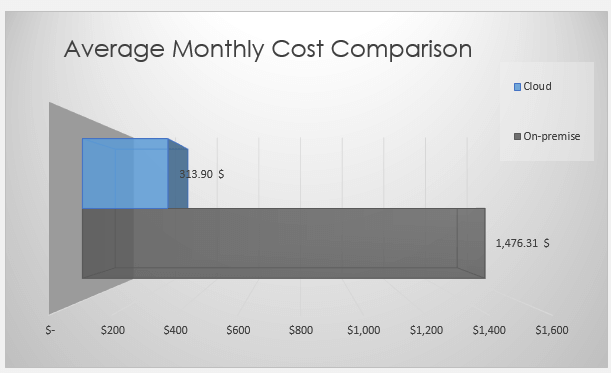If you are using (or used) a help desk system of any kind, you probably know that expenses can reach as low as 50 bucks to as high as 10,000 dollars. Typically, these prices are based on a number of factors, ranging from things such as the type of system you are using, the pricing plan it has, and the number of agents in play.
All of these factors contribute, in a significant way, to the average price and often, removing one can be a challenge as all of the factors are tightly connected. Yet, it doesn’t mean that savings are impossible and this is precisely what we will try to answer today.
Ways to Cut Expenses
As we already said, there are few ways you can save your hard-earned money when using a help desk system. The number one method to leverage on your help desk is to move to a more favorably priced alternative. Yet, if you don’t want to move from the tool, you can always see if there is a cloud version. And lastly, if the cloud version is not your cup of tea, opting for a yearly plan might save you a few coins. The fourth option is to do regular audits and lastly, buy suits. Some of you might argue that this is all vague and does not solve any issue, so let’s discuss each option separately so that you can have a good idea of all the benefits and caveats.
Method #1 - To Cloud or Not to Cloud
As we already said, sometimes, it is cheaper to move to a cloud version of the tool (usually it’s cheaper to use the cloud version). After all, taking good care of the server is a must and it can be pricey as you need to not only follow the state of your components but establish a powerful security system.
Furthermore, there is the problem of installed OS maintenance. That’s right, updating security modules, cleaning up space, and monitoring the load usually results in more downtime, which in itself can be costly. Lastly, if you are a server owner, you need to do regular backups. This process is not really a problem but the fact that you need to think about the storage all the time is, indeed, a headache. Space is a hot commodity and backups don’t come in lightweight.
Sharweb defines that the cost of server ownership is roughly 80% more expensive. On average, the amount of money you spend on an on-premise tool is somewhere around $1,476.31 a month. In contrast, a cloud server with the same configuration is somewhere $313.90 a month. Quite the difference to start thinking of this as the first way to leverage your help desk.

Image Source: SherWeb
Using a cloud version of the system will eliminate all server maintenance work, as well as security concerns. You are still able to do local backups and you can still have the same tool. Besides, pricing isn’t that high as you might think.
Method #2 - Migrate Elsewhere
While not optimal for everyone, this method might prove to be the best solution. Every day, every month, every year we get new help desk solutions that provide amazing features for a fraction of the cost you spend today. Staying on one platform does have its benefits but sometimes, the pricing is nowhere near justified so moving to a cheaper tool might be the way to go. Furthermore, pricing is only part of the story.
There are loads of new help desk solutions that provide amazing features but sometimes, the pricing is not justified and it may be a better solution to move somewhere cheaper.
Take for instance the excellent Salesforce Service Cloud tool. It has all the bells and whistles you might ever need. But you know what else it has, complexity. For your staff to use the system effectively, training and constant consultations are mandatory. All this costs a ton of money that you could allocate elsewhere if you opt for something more affordable and less complicated. Your staff will be grateful and so is your wallet, especially in the long run.
Method #3 - Yearly Subs
It goes without saying, if you are committing for a yearly subscription, it means you are saving 5% to 15% of the original asking price every month. So, if you plan on using your current tool for the foreseeable future, we suggest that you check whether your vendor offers a yearly plan. If you don’t see such an option you can always negotiate this commitment and if that is not an option, search for another tool that offers a good transition plan.
If you are committing for a yearly subscription, it means you are saving 5% to 15% of the original asking price every month.
Although, before you move, it is best that you take a good look at the quality of the tool. Remember, not all that glitters is gold as cheap doesn’t always mean good. Be sure to carefully study the system, read reviews, and ask people that have experience using your potential platform. If you don’t see any reviews or don’t really have the time to examine every nook and cranny, ask for a demo and a free trial. If the vendor is confident enough, it shouldn’t be a problem.
Method #4 - Auditing
We live in an era when a single tool can do so much that it can be hard to allocate it to a certain group. Whether it is your phone or your PC or your tablet, chances are you are using a bunch of apps to extend the basic functionality. Help desk systems are the same in this regard.
Check how often your installed addons are used, how much they cost, and if your staff uses them.
We are pretty positive that some of you already have a couple of extensions and addons installed on your system of choice. What we suggest you do is to check how often your installed addons are used, how much they cost, and why your staff doesn’t use them. Most extensions are cheap but when you add the fact that there are twenty of them, it becomes a smartphone problem.
What’s a smartphone problem you say? Well, it is your phone subscriptions. Take for instance YouTube Premium, it is only $5 bucks but when you factor in Netflix, Spotify, and Podcast Addict. Suddenly you are spending more than $50 a month on things you barely have time to use. The same is with your help desk. Get rid of useless stuff, find cheaper alternatives, and make use of native functionality.
Method #5 - Suites
Companies such as Zendesk offer their products to customers as suites. Said suites are usually cheaper and have a lot of good things in them. Continuing with Zendesk, with their offer you get access to Zendesk Explore, their CRM system, and report tools, among other things. And no, Zendesk isn’t the only platform that offers such packs, Freshdesk, HubSpot, and Salesforce also have something similar.
However, just as with method #2, experience careful threading. Evaluate everything the plan has to offer and make sure that there are no hidden expenses.
Migration 101
And now for the core question. Help Desk Migration is a costly endeavor, even when you do it alone. After all, at times the process is not only lengthy but can cost you hundreds of thousands of dollars. So, how do you save money on it if it’s your only option? The answer can be divided into three sections.
- Look at it from a long-term perspective. Migration, as is, is a one-time expense. If you are planning on using a single tool for more than a year, you will rebate your expenses pretty fast. With so much data that the migration cost is high, we suggest that you strategically pick what data you need immediately and what can wait for the next migration.
- If you are working in e-commerce or retail, make sure your old data is there with you. Why? You are bound to have returning customers. This is critical as knowing what kind of support they got and what kind of service they want will help you build a more loyal relationship. Without old data, this step is pretty much impossible.
- As we already mentioned, you don’t always need to move all of your stuff to the new platform. We offer a partial migration service where you get to decide what data you need and what can stay. This will help you reduce the average cost and in case you are a non-profit organization, we are more than happy to provide you with a discount.
Final Notes
It can be tricky and not always possible to leverage a help desk solution but we hope our recommendations will help you save funds in the long run. But in the meantime, that is all we have for today. If you are still on the fence or maybe want some advice on the migration, we are here to help out. Just give us a call or drop us a message and we’ll send our best people to help you out. Thanks for joining in!



